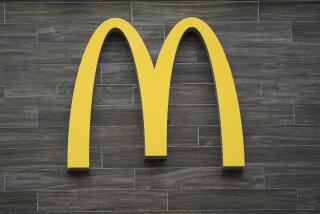Scam Probe Hurts Games Industry
- Share via
The promotions industry that runs contests for big consumer companies was once again under scrutiny Wednesday, the day after an employee of Simon Worldwide Inc. was arrested on suspicion of rigging the games the company created for McDonald’s Corp.
“There’s already a perception that nobody really wins those things, and this type of event fuels that belief,” said Marc Wortsman, executive vice president of promotions firm Marden-Kane Inc. in New York, which has run campaigns for Coca-Cola Co., Campbell Soup Co., Bank of America Corp. and other Fortune 500 companies. “We don’t sleep at night worrying about these things, about security and fairness.”
Meanwhile, problems mounted for Simon as its stock price tumbled 77% on Wednesday.
The promotions company lost 65% of its revenue when McDonald’s fired its Los Angeles-based Simon Marketing Inc. division Tuesday. Simon had been responsible for almost all of McDonald’s games promotions, which included McDonald’s Monopoly and “Who Wants to Be a Millionaire” contests.
The fallout from the McDonald’s incident, however, goes beyond Simon to the broader promotional games industry, which touches millions of Americans with promises of prizes and cash while boosting clients’ profile and customer base.
James U. McNeal, a consultant and a former marketing professor at Texas A&M; University, said incidents like this one do little to encourage faith in consumer promotions.
In a study he did five years ago, McNeal said, half of the respondents said they doubted whether there were winners in similar sweepstakes.
“I think it confirms the lack of confidence a great deal of the public has in contests and sweepstakes, and that hurts the promotional industry and the businesses that sponsor the promotions,” McNeal said. “The public only knows about McDonald’s and their Monopoly game, they don’t know Simon Marketing.”
The problems with the McDonald’s game came to light earlier this week when the FBI arrested eight people, including Simon employee Jerome Jacobson, 58, on mail fraud charges. The $13-million alleged scam, in which Jacobson is accused of funneling winning game pieces into the hands of associates, had been going on since 1995, officials said.
But people in the promotions industry say problems with games and contests are rare.
“The fact of the matter is that virtually all consumer promotions are conducted honestly and legitimately,” said Claire Rosensweig, the president of the trade group Promotions Marketing Assn. “This is news because it happens so rarely.”
Once the stepchild of the advertising industry, the business of promotions has grown into a $300-billion-plus powerhouse that includes rebates, premiums, skill contests and sweepstakes, according to the promotion group.
Simon, one of the leaders in its field, entered the big leagues of promotional work in 1992, when it began handling work for Philip Morris Inc. Two years later, the tobacco giant was Simon’s biggest account, with about 80% of Simon’s sales. Then called Cyrk Inc., the company signed PepsiCo and developed its Pepsi Stuff campaign.
Cyrk went public in 1993 and with the 1997 acquisition of Simon Marketing, it got another boost by signing with clients such as McDonald’s, Chevron and Toys R Us.
Promotions companies are charged with handling anything from project conception to a contest’s security and fairness provisions, such as ensuring that winning game pieces are counterfeit-proof, randomly distributed and redeemable for the promised prizes.
As the promotional industry grew--with spending last year up 10%, the Promotions Marketing Assn. said--so did associated problems, although problems with the contests are still fairly rare.
In the past, promotions problems at McDonald’s--and more recently Burger King--mostly have centered on free giveaways. Of the 9.4 million toys recalled this year, 77% have come from fast-food promotions.
Yet the industry received a black eye last year when sweepstakes giant Publishers Clearing House agreed to refund $16 million to customers who said they bought subscriptions because they were confused into believing they already had won prizes. The company also agreed to stop using direct-mail solicitations that looked like winning checks.
And in March, Readers’s Digest Assn. settled a lawsuit brought by the District of Columbia, California and 31 other states, agreeing to avoid deceptive advertising for its sweepstakes and to refund more than $6 million to sweepstakes customers, including about $1.5 million to Californians.
State and federal lawmakers have rushed to catch up with the industry. Florida and New York have some of the most stringent rules, which among other things, require that contest sponsors register their promotions, post a bond equal to the winnings offered and publish a list of winners.
Simon executives did not return calls seeking comment.
Shares of Simon fell $2.35 on Nasdaq to close at 70 cents. Shares of McDonald’s rose 25 cents to close at $30.25 on the New York Stock Exchange.
*
Times staff writer Sam Kennedy contributed to this report.
More to Read
Inside the business of entertainment
The Wide Shot brings you news, analysis and insights on everything from streaming wars to production — and what it all means for the future.
You may occasionally receive promotional content from the Los Angeles Times.










